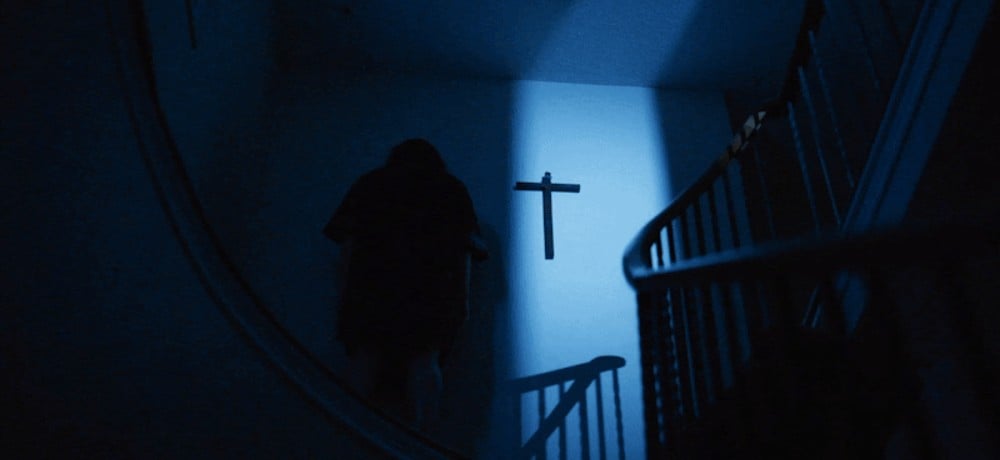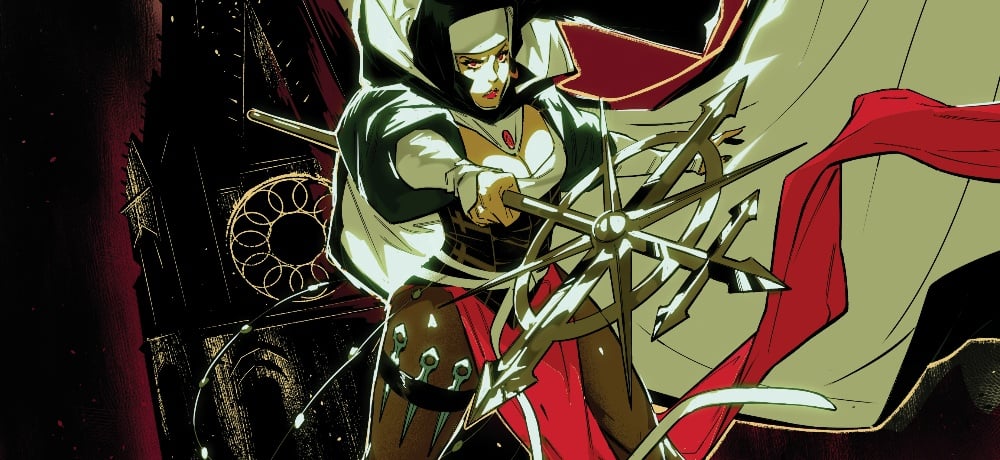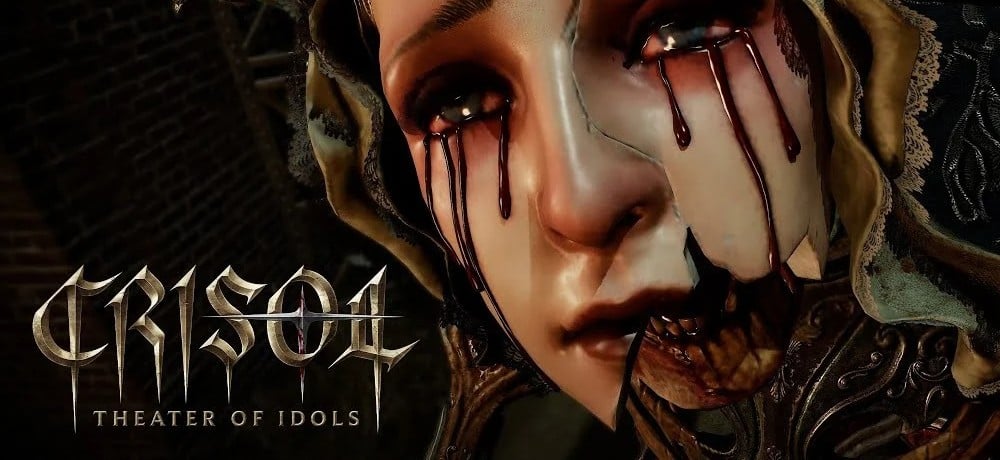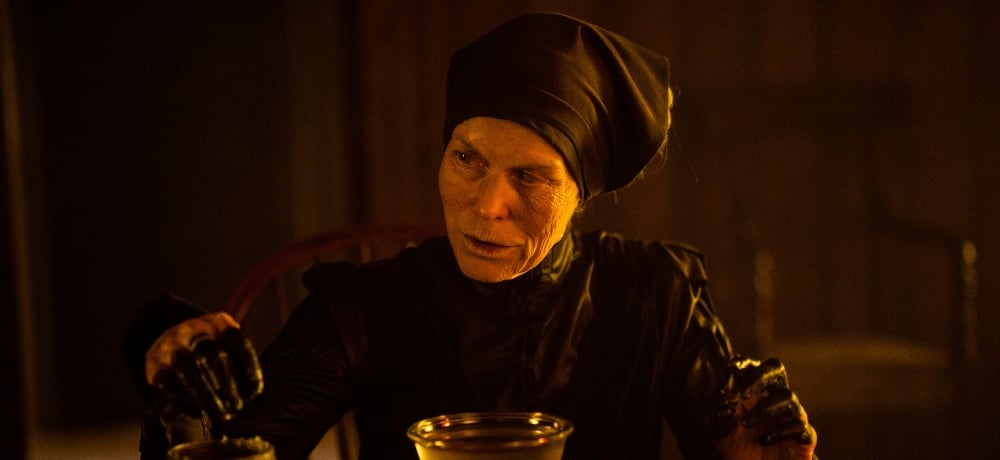






One of the greatest performers of her, or any generation really, Alice Krige has given us endless entertainment to enjoy for nearly 40 years now. From Chariots of Fire to Ghost Story to Star Trek: First Contact to Sleepwalkers to Silent Hill to Thor: The Dark World, without a doubt, Krige has proven herself time and time again to be in a class all her own.
Krige’s latest role is in Osgood Perkins’ Gretel & Hansel, in which she plays The Witch, who befriends the titular characters (played by Sophia Lillis and Samuel Leakey), but has sinister plans in mind for the siblings, who are unaware that their host isn’t exactly as she seems. Recently, Daily Dead had the pleasure of speaking with Krige about taking on the role of The Witch, and what attracted her to the character at the beginning.
Krige also discussed how much she enjoyed the depths that this new adaptation goes to, in terms of fleshing out these well-known characters, and how the timelessness of Gretel & Hansel is reflective of the horrors we face these days. And because this writer has been a fan of Ghost Story for nearly her entire lifetime now, I couldn’t resist speaking with Krige about the parallels between her roles in that classic film versus her character in Gretel & Hansel as well.
Look for Gretel & Hansel in theaters everywhere this weekend, courtesy of Orion Pictures.
I'd love to just start at the beginning with Gretel & Hansel and discuss the initial appeal of this project for you, in terms of coming on board and wanting to play The Witch?
Alice Krige: When I met Oz, I was absolutely captivated by his take on The Witch. We all know the fairy tale and every culture, one way or another, has a version of the fairy tale, of the children abandoned in the forest in the great, wide, terrifying world and being confronted and consumed by danger and ultimately surviving it. But you know nothing about who The Witch is. She's human, but almost inhuman because she does this terrible thing of eating children.
But Oz and this script that he co-wrote suddenly gives you an insight into what brought this human being to this horrifying and terrible place. And as an actor, what interests me is human beings and the difficulty in being human, and the human condition. And this was such an astonishing insight into this character that I've known since I was a little girl. Suddenly, there was this insight into someone who had once been a loving mother, who somehow had the thread of darkness running through her.
And that's who The Witch is. She's consumed by the darkness. Trauma takes her into that place, and that is such an intensely compassionate, human, empathetic way of peering into the heart and the soul and the mind of this character we've, one or another, all of us grown up with. And I found, in particular, Oz's take on it to be so compelling and so engaging. I was just very touched by it, to explore something that was a cipher and turn it into something living and breathing and human, but also archetypal as well.
What I also thought was really interesting about this film is what it has to say about women and their roles in society. Was that something that resonated with you at all in terms of what your character goes through, the things that Gretel goes through, and these things that we put upon women? It feels wholly relevant to today’s issues in so many ways.
Alice Krige: Well, I think what's wonderful about what Oz did with this story is that it's set out of time. The fairy tale is an archetype; that's what all the fairy tales are. But he's managed to set it in a timeless part of time. It's not contemporary, but it's not specific a period either, although it resonates in a sort of medieval way. But it's not. This is very Oz, and this all emanates from him. The design, the sets, the costumes, locations, are very real, but they're also surreal, too.
It's close enough to our own experiences today, for us to be able to identify with it, but it's also archetypal enough for it to resonate on an unconscious level. I haven't seen Gretel & Hansel yet, so what I'm talking about is the experience of making it. I hope that's what we accomplished with it. That's the story we grew up with as children, and it's unpacked in a very contemporary, very present kind of way.
It does speak to a particularly female experience, although it's not particularly female. You know, it could have been told from Hansel's point of view and it would have been just as resonant. It's a female experience, but it's, I think above all, a human experience. It's about what it is to be human. We have choices between light and dark. The Witch wound up going down a dark path. For me, I don't know how the movie turned out, but I think Gretel, maybe just because of who Sophia is and what she brings to Gretel, I hope that the audience is left with the sense that she is someone who wants to do good.
These days, we see very graphic horror now on the television. Horror in all things, whether it's what's happening in Yemen, Syria, or in movies that we make. It's so present in our world. I hope that this movie takes what we see and translates it into a big picture, where three or four days after you've seen the movie, you start thinking about what it means to be human, faced with choices that are dark and light. It kind of unpacks this iconic fairy tale in a very, very human, compassionate way.
I know we’re almost out of time, but I’d be remiss if I didn’t mention Ghost Story before we go. I am somebody who grew up loving horror movies because of my mom, where she'd take me to these movies when I was far too young. And one of those movies was Ghost Story. What's interesting to me is that I was terrified of Alma and Eva as a child, and thought she was the villain; but as an adult, I can see there's this inherent sadness to the things that happened to her in that film. And that, for me, is the real horror of it, is just how these men sort of put everything on her, and yet ultimately she's stripped of her humanity because of their actions.
And actually, after I watched Gretel & Hansel, I came home that night and I watched Ghost Story and it seems like there are some really beautiful parallels between the two. Was that something you recognized as well?
Alice Krige: Oh, she's not the villain at all. If she's anything, she's the victim. When I was offered the role, it was an extraordinary challenge to play reincarnations of the same soul, as it were, but it's immensely sad. She was not looking for what happened to her, but that she should come back to seek vengeance is heartbreaking, but totally understandable. But there's a warping of a human being by what happened to her. And Eva died in the most tortured way and if you look at it, she comes back because of the pain and the grief and she takes it out on the next generation. I mean, there is that saying that goes, “The sins of the fathers will be visited upon the next generations,” or whatever the verse is.
What is so potent about horror movies is that when they are done, not for shock horror, but to just peel the surface, to peel the onion of what it is to be human, because it's not easy. It is not easy to be human. We're given the power of creativity and we use it for good and for ill. And the best of horror shows that to us, presents us with who we are and what we are in writ large. But when it's really potent, it kind of confronts us with what it is to be human. And when it goes down that road, when it asks those questions, I think it's a very potent genre and a very potent form.
Also, I just have to say, before we say goodbye, that Gretel & Hansel was one of those experiences that you treasure as an actor for the rest of your life. Where you go to set and you feel as if you're dreaming. You walk into a dream space, and that's only possible when every single member of the company gives it that value. So the set design, costume, hair and makeup, the lighting crew, the people who put the cups in holders in the apothecary, everyone brought the best possible contribution to this film and made it possible.
For me, Gretel & Hansel was one of those experiences where the contribution that every single member made, made it this free space, which is out of time, where you have this weird experience that you're not actually doing it, it's just happening to you. And it's very precious when that happens. Gretel & Hansel was one of those experiences, so I applaud and thank the crew and the company that made it possible for that to happen.
---------
Check here to catch up on our previous coverage of Gretel & Hansel.